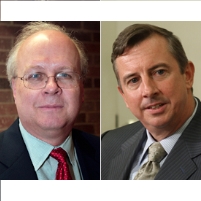Unregulated Outside Spending Wins Elections: 2010 Edition
Monday, November 08, 2010
 Karl Rove and Ed Gillespie, non-candidate winners of the 2010 elections
Karl Rove and Ed Gillespie, non-candidate winners of the 2010 elections
The key to winning many of year’s contested congressional races was getting more help from outside groups than the other side from groups that either accept unlimited contributions or do not disclose the source of their money.
In 58 out of 74 House and Senate seats that switched parties, the winner received nearly three times more money and assistance than the loser, according to Public Citizen. In dollar terms, the victors benefited from an average of $764,326 by independent groups, while the defeated enjoyed an average of only $273,268, a ratio of almost 2.8 to 1.
In the Illinois U.S. Senate race, Republican Mark Kirk benefited from nearly $8 million in help to beat Democrat Alexander Giannoulias, thanks largely to $5.6 million from the conservative American Crossroads political action committees and $1.7 million by the U.S. Chamber of Commerce. Outside assistance broke Kirk’s way by a ratio of 11 to 1.
In Pennsylvania’s Senate contest, Republican Pat Toomey enjoyed a 4-to-1 advantage in aid from outside groups over Democrat Joe Sestak. The largest contributors were the Club for Growth Action Fund ($2.5 million), an independent expenditure committee of the organization that Toomey once ran as president, the U.S. Chamber of Commerce ($1.7 million) and
the Republican Jewish Coalition ($1.1 million).
Overall, the Club for Growth claimed a record of 20 wins and only 3 losses, with 3 races still undecided. The U.S. Chamber of Commerce raked up a record of 38-21 and American Crossroads, investing in more challenging races, won 23 and lost 13.
Urged on by Karl Rove, George W. Bush’s senior advisor and deputy chief of staff, and Ed Gillespie, counselor to Bush, the groups coordinated their spending, beginning with meetings that initially were held in Rove’s living room.
-Noel Brinkerhoff, David Wallechinsky
Outside Job: Winning Candidate Enjoyed Advantage in Unregulated Third-Party Spending in 58 of 74 Party-Shifting Contests (Public Citizen) (pdf)
Rove Groups, U.S. Chamber Build Winning Record in Elections (by Jonathan D. Salant and Traci Mc Millan, Bloomberg)
Club for Growth Win-Loss Record (Club for Growth)
Republican Groups Coordinated Financial Firepower (by Jeanne Cummings, Politico)
40% of Outside Campaign Money was Made Possible by Supreme Court Ruling (by Noel Brinkerhoff, AllGov)
- Top Stories
- Unusual News
- Where is the Money Going?
- Controversies
- U.S. and the World
- Appointments and Resignations
- Latest News
- Musk and Trump Fire Members of Congress
- Trump Calls for Violent Street Demonstrations Against Himself
- Trump Changes Name of Republican Party
- The 2024 Election By the Numbers
- Bashar al-Assad—The Fall of a Rabid AntiSemite






Comments